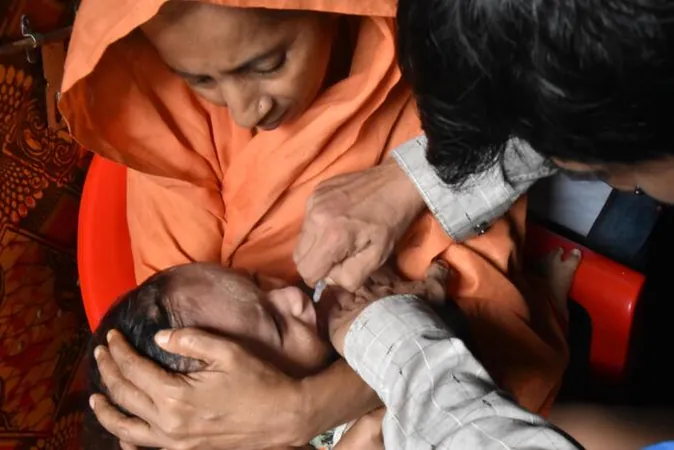
Lifesaving Polio Vaccination Initiative Protects 144,000 Children in Rohingya Camps, Bangladesh
2024-09-27
Introduction
In a vital effort to eradicate poliomyelitis, the World Health Organization (WHO) and the Government of Bangladesh (GoB) have successfully launched a two-round 'mop-up' vaccination campaign in the Rohingya Refugee Camps located in Cox's Bazar. This initiative aims to provide the bivalent Oral Polio Vaccine (bOPV) to an impressive 144,317 children under five years of age, forming a crucial part of the WHO’s Global Polio Surveillance Action Plan for 2022-2024.
The Importance of Vaccination
Polio, a devastating viral disease that primarily affects young children, is transmitted through contaminated food and water or direct contact with fecal matter. The virus can lead to paralysis, and its eradication remains a global health priority. “As a proud polio-free nation, Bangladesh remains unwavering in its vigilance to uphold this status,” remarked Dr. Bardan Jung Rana, WHO Representative to Bangladesh. “This collaborative campaign exemplifies our dedication to protecting the health of every child, particularly in the most vulnerable communities.”
Context of the Rohingya Crisis
The Rohingya crisis, which began on August 25, 2017, has seen approximately 700,000 people fleeing to Bangladesh to escape ongoing violence in Myanmar’s Rakhine State. As of March 2024, over 942,944 refugees, living in cramped conditions in Cox's Bazar, face increased health risks, including the threat of polio.
Detection of Poliovirus
Although Bangladesh was certified polio-free by the WHO in 2014, environmental samples taken from the refugee camps in January 2024 revealed the presence of Sabin-like type 1 polioviruses (SL1). This alarming discovery indicated that vaccination coverage had fallen below optimal levels, leaving many children vulnerable to the disease.
The Vaccination Campaign
To combat this growing threat, the WHO and GoB spearheaded a targeted vaccination campaign composed of two phases: the first from July 14 to July 31, 2024, followed by a second phase from September 1 to September 12, 2024. A dedicated team of 1,650 Community Health Workers (CHWs) and 140 Community Health Supervisors (CHWS) went door-to-door to ensure thorough vaccination coverage across the 33 camps in Ukhiya and Teknaf.
Campaign Results
The campaign not only provided crucial funding for vaccines but also included implementation and technical support. By the end of the first round, a remarkable 176,052 children were vaccinated, exceeding the target by 122%. In the second round, despite a target of 176,052, 175,482 children received their second dose, alongside 7,497 children who were vaccinated for the first time, including 1,957 newly arrived children.
Conclusion
This ambitious vaccination effort represents a critical step in safeguarding the health of Rohingya children during a time of great uncertainty. It underscores the global commitment to immunization and highlights the importance of reaching vulnerable communities. The fight against polio continues, and initiatives like this are crucial in paving the way for a polio-free future for generations to come.
Call to Action
Stay tuned for more updates on global health initiatives and their transformative impacts on vulnerable populations. Together, we can make a difference!


 Brasil (PT)
Brasil (PT)
 Canada (EN)
Canada (EN)
 Chile (ES)
Chile (ES)
 España (ES)
España (ES)
 France (FR)
France (FR)
 Hong Kong (EN)
Hong Kong (EN)
 Italia (IT)
Italia (IT)
 日本 (JA)
日本 (JA)
 Magyarország (HU)
Magyarország (HU)
 Norge (NO)
Norge (NO)
 Polska (PL)
Polska (PL)
 Schweiz (DE)
Schweiz (DE)
 Singapore (EN)
Singapore (EN)
 Sverige (SV)
Sverige (SV)
 Suomi (FI)
Suomi (FI)
 Türkiye (TR)
Türkiye (TR)